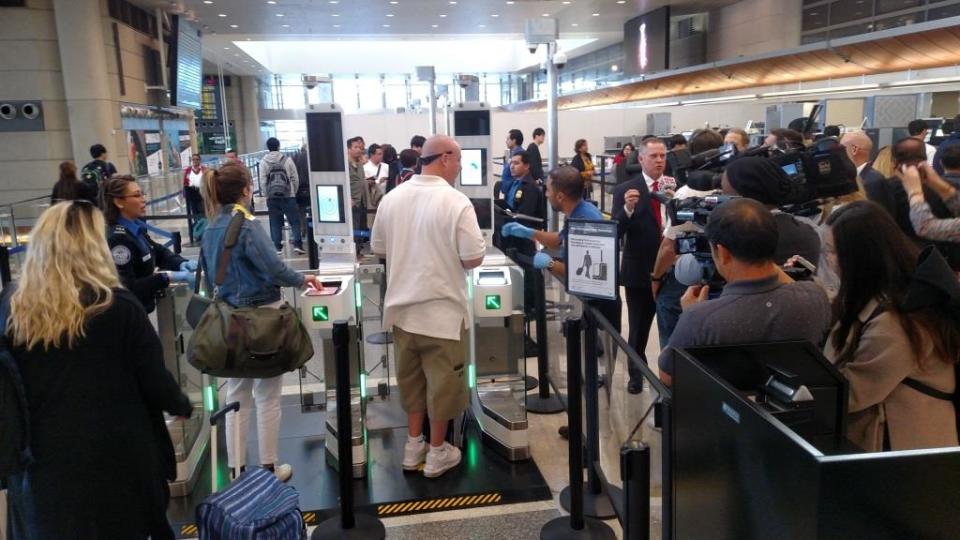The Future of Travel: New tech coming in 2018
The introduction of new technology is changing the speed and efficiency of traveling. Here are four new advances that will transform the way you travel in 2018
Delta biometrics at lounges
Airlines are always looking for ways to make the user experience more seamless. That’s why Delta Air Lines (DAL) has enabled biometric technology for travelers to gain access to airport lounges. Starting on March 26, Delta Sky Club members who have signed up for CLEAR, can use their fingerprints to enter all 50 U.S. Sky Club locations.
If you don’t have CLEAR, a service that expedites the screening process by verifying your identity using biometrics, you can simply visit one of the enrollment kiosks and sign-up for free. The only caveat is that you must be a U.S. citizen or permanent resident.
Delta says that they tested the fingerprint scanner for under a year, making improvements along the way. Some of the improved features include a new design, ergonomic finger supports to promote successful scans, and sound/light features to make processing easier to understand.
This isn’t the first time the airline has used biometric technology to improve the customer experience. Delta is currently testing biometric boarding experiences, where SkyMiles members enrolled in CLEAR would be able to forego a paper boarding pass in favor of scanning their fingerprint.
Facial recognition
Biometric technology has also been introduced at LAX Airport in Los Angeles, at least temporality. On Feb. 2, the Transportation Security Administration (TSA) launched a three-week trial to experiment with how facial recognition could speed up the security process.
The test includes two gates in the Tom Bradley International Terminal, where passengers scan their passports and boarding passes. The gate instantly verifies that the information on both documents match, and then snaps a photo of the traveler. Newer passports contain a microchip version of your photo, so the gate also compares your new photo with the one stored in your passport. If everything matches, passengers are given a green light. While a TSA agent will still verify passenger identities to make sure no mistakes occurred, the hope is that one day fewer personnel will be needed.

“TSA expects that facial recognition may help reduce dependencies on TSA personnel and expedite security processes, resulting in shorter lines and reduced wait times,” the TSA said in a memo.
For now, the biometric gates will only be used for a few hours each day, but trials like this are becoming more and more popular. Miami International Airport started a facial recognition pilot program last November, and Orlando International Airport (MCO) now allows biometric boarding with facial recognition for British Airways flights to London’s Gatwick Airport. JetBlue also experimented with facial recognition during boarding last June at Boston’s Logan International Airport.
Travel advice from Alexa
One of the best things about a travel agent is that they offer personalized travel recommendations. Now your voice assistant can do the same thing. Starting this week, the Google Assistant and Amazon Alexa can ask Lonely Planet to help you plan a trip.
All you have to do is ask the devices, “Let me talk to Lonely Planet,” and your device can share more information about a specific destination and insider tips for what to do. On the Alexa app you can also enable the Lonely Planet skill.
Lonely Planet is the largest travel-guide book publisher in the world and provides travel information on destinations all around the world. If you’re planning a summer trip, now you can put together the perfect itinerary without lifting a finger.
Driverless buses at Gatwick
Much has been written about the future of driverless vehicles, and the dangers of putting these cars on the road. Still, London’s Gatwick Airport has decided to deploy driverless buses during a six-week trial this summer.
The trial is the first of its kind at any airport, and will consist of workers being shuttled back and forth between the North and South terminals on airside roads. Passengers and aircrafts will not be involved in the trial.
Gatwick partnered with Oxbotica, a company that develops software that enables vehicles to run autonomously. The data collected will help to determine if autonomous vehicles can successfully operate on a busy airfield. If the trials have positive results the International Air Transport Association (IATA) sees more than 40 different uses for this technology, including push back tugs, passenger load bridges, and baggage vehicles.
While passengers won’t be riding in these vehicles, it’s interesting to know that the bus you see on the tarmac might not be driven by a human in the future.
Brittany is reporter at Yahoo Finance. Follow her on Twitter @bjonescooper.
Credit card debt has now reached pre-recession levels
The Points Guy: Fliers should question their airline loyalty

